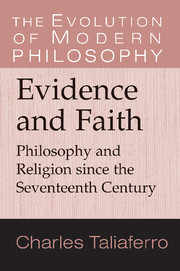Book contents
- Frontmatter
- Contents
- Acknowledgments
- Introduction
- 1 The Sovereignty of the Good in Seventeenth-Century Philosophy of Religion
- 2 Cartesian Philosophy of Religion
- 3 The Ascendancy of Rules of Evidence in Early Modern Philosophy of Religion
- 4 Humean Philosophy of Religion
- 5 Kantian Philosophy of Religion
- 6 Religion and the Philosophical Gods and Giants
- 7 Continental and Feminist Philosophy of Religion
- 8 Five Major Moves
- 9 Religions, Evidence, and Legitimacy
- Appendix A A Guide to Further Study
- Appendix B Select Contemporary Philosophers
- Select Bibliography
- Index
4 - Humean Philosophy of Religion
Published online by Cambridge University Press: 15 December 2009
- Frontmatter
- Contents
- Acknowledgments
- Introduction
- 1 The Sovereignty of the Good in Seventeenth-Century Philosophy of Religion
- 2 Cartesian Philosophy of Religion
- 3 The Ascendancy of Rules of Evidence in Early Modern Philosophy of Religion
- 4 Humean Philosophy of Religion
- 5 Kantian Philosophy of Religion
- 6 Religion and the Philosophical Gods and Giants
- 7 Continental and Feminist Philosophy of Religion
- 8 Five Major Moves
- 9 Religions, Evidence, and Legitimacy
- Appendix A A Guide to Further Study
- Appendix B Select Contemporary Philosophers
- Select Bibliography
- Index
Summary
Every enquiry, which regards religion, is of the utmost importance.
David HumeLife and Death in 1776
David Hume's (1711–1776) health began to fail in 1772. Despite the growing hardships of fever, internal hemorrhages, and weight loss (he dropped seventy pounds in a year), he remained in possession of his powers and mild tempered, certain that he would die soon. Hume wrote an account of his life that included the following portrait.
In spring 1775, I was struck with a disorder…. I now reckon upon a speedy dissolution. I have suffered very little pain from my disorder; and what is more strange, have, notwithstanding the great decline of my person, never suffered a moment's abatement of my spirits; insomuch, that were I to name the period of my life, which I should most choose to pass over again, I might be tempted to point to this later period. I possess the same ardour as ever in study, and the same gaiety in company. I consider, besides, that a man of sixty-five, by dying, cuts off only a few years of infirmities; and though I see many symptoms of my literary reputation's breaking out at last with additional luster, I knew that I could have but a few years to enjoy it. It is difficult to be more detached from life than I am at present.
- Type
- Chapter
- Information
- Evidence and FaithPhilosophy and Religion since the Seventeenth Century, pp. 160 - 214Publisher: Cambridge University PressPrint publication year: 2005

